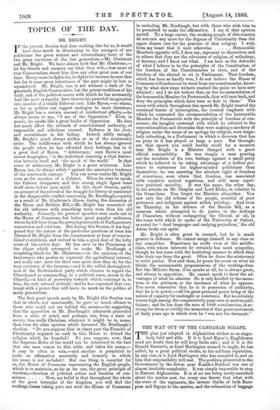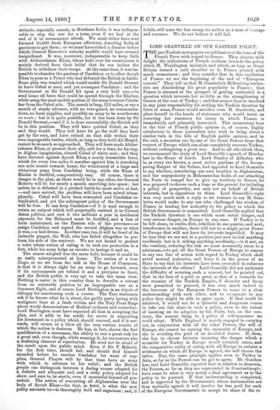THE WAY OUT OF THE CANDAHAR SCRAPE.
T"plan just adopted in Afghanistan strikes us as singu- larly bold and able. If it is Lord Ripon's, Englishmen need not doubt that he will keep India safe ; and if it is Sir Donald Stewart's, as Lord Hartington seemed to imply, he has added, by a great political stroke, to his military reputation. In any case, it is Lord Hartington who has accepted it, and on him that responsibility will rest. The problem presented to the Government by the defeat near Kushk-i-Nakhud was one of almost insoluble complexity. It was simply impossible to atop in Eastern Afghanistan. It is of no use being mealy-mouthed about the matter now, for everyone knows that what with the state of the regiments, the intense dislike of both Euro- pean and Sepoys to the service, and the exhaustion of baggage animals, especially camels, in Northern India, it was indispen- sable to stop the war for a term, even if we had at the end of it to recommence afresh. We must either have sent forward 10,000 fresh European effectives, denuding India of garrisons to get them ; or we must have risked a disaster before which General Burrows's unlucky muddle would have seemed insignificant. It was, moreover, indispensable to keep faith with Abdurrahman Khan, whose hold over his countrymen is mainly derived from their belief that he can induce the British to withdraw their troops. At the same time, it was im- possible to abandon the garrison of Candahar, or to allow Ayoub Khan to pose as a Prince who had defeated the British in battle. Some plan was wanted which would enable Sir Donald Stewart to leave Cabul at once, and yet reconquer Candahar ; and the Government or Sir Donald hit upon a very bold one,—to send home all force that could be spared through the Khyber, while using the most mobile portion of the army to rescue Canda- har from the Cabal side. The march is long, 313 miles, or say a month of steady advance, with no rear-guard, no communica- tions, no local supplies, and possibly an army to be overthrown en route ; but it is quite possible, for it has been done by Sir Donald Stewart,—and if it is done successfully, the British will be in this position. They will have quitted Cabul, as they said they would. They will have let go the wolf they have got by the ears, and have retired on that side within their own impregnable border, which, so long as they hold Ali Musjid, cannot be so much as approached. They will have made Abdur- rahman Khan, at present their ally, safe for a time, he having, in Afghan imagination, cleared Cabul of white men ; and they have directed against Ayoub Khark a nearly irresistible force, which for every two miles it marches against him is marching one mile nearer towards home, the withdrawal of a large and victorious army from Candahar being, while the Khan of Khelat is faithful, comparatively easy. Of course, there is danger in the plan, as there would be in any other, for General Roberts will be for nearly a month marching into space ; but unless he is defeated in a pitched battle he must arrive at last, —and once arrived, the problem will have been solved trium- phantly. Cabal will have been evacuated and Candahar re- vindicated, and yet the subsequent policy of the Government will be free. It can keep Candahar—if it is mad enough to retain an outpost which will perpetually embroil it in Central Asian politics, and cost it two millions a year in incidental expenses, for the Helmund must be fortified, and a line of forts maintained, on the Eastern side of the province—or resign Candahar, and regard the second Afghan war as what it was,—a bad dream. In either case, too, it will be freed of its imbecile puppet, the Wall, who has failed altogether to per- form his side of the contract. We are not bound to protect a ruler whose notion of ruling is to seek our protection in a fort, while his army helps an invader to besiege it and us. The course adopted was the more bold, because it could be so easily misrepresented at home. The notion of a true Tmgo, as we see from the talk in the House of Commons, is that it is always right for an army to go forward, even if its cantonments are behind it and a precipice in front, and the British public is very apt to take the same view. Nothing is easier in this country than to describe a retreat from an untenable position to an impregnable one as a timorous flight, and of course Lord Hartington is an object of obloquy for sanctioning such a course. The Tory statesmen ask if he knows what he is about, the gadfly party spring with malignant buzz at a fresh victim, and the Tory Press flings about wordy denunciations of Radical rashness and cowardice. Lord Hartington must have expected all that in accepting the plan, and it adds to his credit for nerve in supporting his lieutenant in a policy which should succeed, and if it suc- ceeds, will secure at a blow all the very various results of which the nation is desirous. He has, in fact, shown the first qualification of a statesman, the ability to run a great risk for a great end, even though, while running it, he encounters also A deafening clamour of reprobation. He need not be afraid of the result upon the public mind. Even if Sir F. Roberts, for the first time, should fail, and should find himself stranded before he reaches Candahar for want of sup- plies, General Phayre will by that time have an army with which to advance to his relief ; and the British people can distinguish between a daring course adopted for a definite and adequate end, and a risky policy adopted for show, and sure to be sterile, even if successful beyond all pre- cedent. The notion of evacuating all Afghanistan over the body of Ayoub Khan—for that, in brief, is what the new policy amounts to—is thoroughly bold and sagacious ; and, if
it fails, will none the less stamp its author as a man of courage and resource. We do not believe it will fail.































 Previous page
Previous page